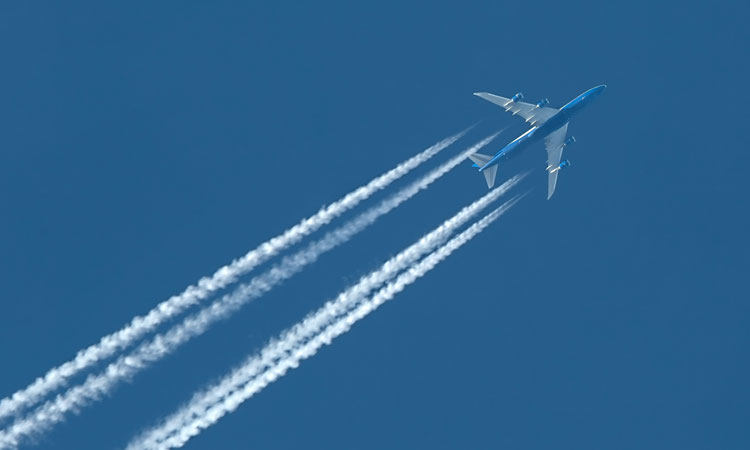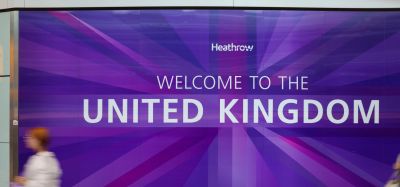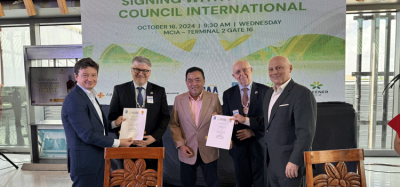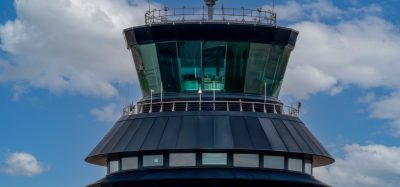Aviation’s climate commitments: Clean skies from COVID-19 and beyond
- Like
- Digg
- Del
- Tumblr
- VKontakte
- Buffer
- Love This
- Odnoklassniki
- Meneame
- Blogger
- Amazon
- Yahoo Mail
- Gmail
- AOL
- Newsvine
- HackerNews
- Evernote
- MySpace
- Mail.ru
- Viadeo
- Line
- Comments
- Yummly
- SMS
- Viber
- Telegram
- Subscribe
- Skype
- Facebook Messenger
- Kakao
- LiveJournal
- Yammer
- Edgar
- Fintel
- Mix
- Instapaper
- Copy Link
Posted: 29 April 2020 | Dave Mullaney - Rocky Mountain Institute, LeeAnn Baronett - Rocky Mountain Institute | No comments yet
Dave Mullaney and LeeAnn Baronett from Rocky Mountain Institute, a non-profit organisation in the field of sustainability, explore how COVID-19 opens up the potential for aviation to double-down on its decarbonisation goals.


The cloud of COVID-19 has unleashed a storm of destruction on our society and economy, but it’s also had some environmental silver linings. Because the volume of people and goods moving across the country has fallen precipitously, so have the carbon emissions and pollutants associated with transportation. However, the reasons for these emissions reductions have been catastrophic to our economy – with aviation hit particularly hard.
Demand for air travel has decreased, with tens of thousands of flights cancelled since the virus began spreading across the globe, leading the International Air Transport Association (IATA) to project that airline revenues will decline by hundreds of billions in 2020.
Ever-increasing carbon emissions from aviation will ultimately destroy relationships with consumers and regulators, resulting in COVID-like demand destruction
Once the pandemic passes and airlines’ financial health slowly returns to normal, it is likely that emissions from the aviation industry will also resume their trajectory as one of the fastest growing segments of annual greenhouse gas emissions. While the financial health of the industry is critical, this return to normal comes with its own risk: That ever-increasing carbon emissions from aviation, and the issues they cause, will ultimately destroy relationships with consumers and regulators, resulting in COVID-like demand destruction, but with no natural recovery on the horizon.
Before the COVID-19 crisis, the aviation industry had already taken the first steps to addressing its carbon emissions. In 2016, over 192 countries agreed to the Carbon Offsetting and Reduction Scheme for International Aviation (CORSIA), a market-based emissions reduction programme set to begin in 2021 with the goal of limiting net emissions growth from aviation to 2020 levels. Under CORSIA, airlines will buy credit to offset emissions from their flights. Carbon offsets are verified to neutralise the impact of the use of fossil fuels, such as air travel or road travel, by keeping greenhouse gases out of the atmosphere at a project site. Some projects grow living things that capture carbon and others prevent the greenhouse gases from escaping in the first place by doing things like producing clean wind energy instead of coal-fired energy, or capturing methane from landfills.
It is imperative for the industry to focus on the biggest long-term risk to demand: Consumers reducing their air travel due to the carbon impact of flying
The COVID-19 crisis must not become a pretext for the aviation industry to back away from its decarbonisation goals. With COVID-19 showing how vulnerable the industry is to demand destruction, it is imperative that the industry focuses on the biggest long-term risk to demand: Consumers reducing their air travel due to the carbon impact of flying. For that reason, the entire aviation industry – airports, airlines, aircraft manufacturers and, yes, individual and business travellers – must work toward the decarbonised future of the industry. This means continuing to offset emissions in the near term, but also investing – today – in low and zero lifecycle carbon biofuels (known as sustainable aviation fuels or SAF), which are the long-term sustainable future of aviation.
Fortunately, leaders in the aviation industry, even in the COVID-19 crisis, have not lost sight of the fact that meeting customer needs – including the need for decarbonisation – is what will keep them in business in the long term. For the airports and airlines Rocky Mountain Institute (RMI) works with, climate continues to be a business-critical activity. “Even in this uncommon time, the San Diego International Airport (SAN) continues its commitment to being one of the most sustainable airports in the world,” said Brendan Reed, Director of Planning and Environmental Affairs for the San Diego County Regional Airport Authority. “In fact, it is this legacy of sustainability leadership – economic, social, and environmental – that will help us rebound from COVID-19 more quickly and successfully.”
The Good Traveler is the only airport-founded and aviation-focused carbon offset programme that empowers airports, organisations, cities and individuals to mitigate the climate impact of travel
For the past four years, RMI has been working closely with those leading airports and airlines through the programme The Good Traveler. The Good Traveler is the only airport-founded and aviation-focused carbon offset programme that empowers airports, organisations, cities and individuals to mitigate the climate impact of travel. The Good Traveler’s airport partners serve 410 million passengers annually, and include Austin-Bergstrom International Airport, Dallas-Fort Worth International Airport, Hartsfield-Jackson Atlanta International Airport, The Port Authority of New York & New Jersey, Port of Seattle, San Diego International Airport (the programme’s founder) and San Francisco International Airport. Over the last four years, The Good Traveler has offset over 600 million miles of air travel, which is equivalent to over 220 million pounds of CO2. Beginning later in 2020, The Good Traveler is planning to offer SAF as a component in all offsets that it sells.
Our journey to cleaner skies can’t stop just because our trip got interrupted. If you are in the process of moving from California to New York to start a new job and your car breaks down in Nebraska, you most certainly have to pause to have your car fixed. However, you’re not going to stay in Nebraska for the rest of your life (not that Lincoln isn’t lovely). You have to stay the course and keep moving forward, and that’s exactly what The Good Traveler and its airport partners are doing.
Biographies




Related topics
Airport crisis management, COVID-19, Emissions, Sustainability, Sustainable Aviation Fuel (SAF), Sustainable development
Related organisations
Rocky Mountain Institute, San Diego County Regional Airport Authority


















